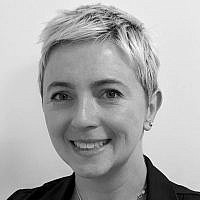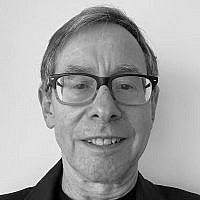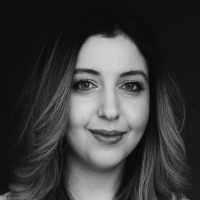Hadassah’s Big Tent Welcomes All Zionists
Ever since anti-Israel campus demonstrations began exploding around the country, many of us have been glued to our phones watching social media in real time as college students are verbally and sometimes physically assaulted, coast to coast, simply for being Jewish and being Zionists.
Many organizations are working to keep students safe, but Hadassah is one of the few speaking directly to their parents. Hadassah understands that emotions don’t stop when students step off campus and that whatever parents think about the issues, their primary concern is their children’s safety.
As Hadassah’s Israel and Zionism educator, I’ve always known the needs of this ignored group should be addressed. When the post-October 7 outpouring of support for Israel began to be drowned out by unrelenting criticism that quickly took on an antisemitic tinge, I felt it couldn’t wait any longer.
The program I created explained to parents that social media is playing a huge role in shaping how the world sees Israel and Zionism. The Anti-Defamation League has reported that antisemitism on social media has risen dramatically since the Hamas invasion, and according to consumer insight company Experian Simmons, 98% of college-aged young adults are on social media platforms. My goal was to enable parents to help their children navigate what it means on social media to be pro- or anti-Israel – for example, what words and phrases should parents look out for.
Before coming to work at Hadassah, I spent almost 20 years on college campuses creating Israel-education curricula and Israel programming. Having learned so much from the students I worked with, I realized that Hadassah’s almost 300,000 members might be interested in how younger generations think about Israel and Zionism.
One of the programs I created that continues to this day is What Zionism Means to Me. At Hadassah chapters around the country, we invite young, female Zionists known to the community – heads of relevant organizations, reporters, opinion leaders, etc. – to be part of a conversation about how Zionism has evolved and about how many people – especially those in their 20s, 30s and 40s – see it today. Each speaker brings a unique perspective about why she identifies as a Zionist.
The Hadassah members who have attended these discussions often tell me they’ve appreciated hearing from younger women because they tend to look at Israel and Zionism through a wider lens than previous generations did.
Another program we launched, a series called Evolving Zionism: A Safe Space for Candid Conversations, is about how each generation approaches Israel and Zionism in a different way. One of the events in the series, “My Zionism/Your Zionism: Young Judaea Intergenerational Perspectives,” was an intergenerational discussion among panelists who included Hadassah members and members of their families who have participated in Year Course, Young Judaea’s gap year program in Israel.
I moderated the program and when I asked the women who had participated in Year Course between its founding, in 1956, and 1970 whether they had talked about Israel when they went to college after returning to the US, to a person the answer was “no.” When I asked the same question of their children, i.e., women who had participated in Year Course between 1970 and 1990, I got the same answer. When I turned to the youngest women, those who had participated in Year Course between 2010 and today, I didn’t need to ask the question because I knew the answer: they had. Instead, I asked how many of them had been criticized for going to Israel and being Zionists. More than 50% of them raised their hands (so did I).
I hadn’t intended my question to shock the older women, just to remind them that their children and the Jewish community are facing challenges which, as recently as 15 or 20 years ago, had been unimaginable.
For example, when I was in college, between 2001 and 2005, my friends and I only spoke about Israel in a very generic, non-political way, for example, “Let’s go on a Birthright trip.” It wasn’t long afterwards, however, that even the most innocent mention of Israel on a college campus could precipitate strong, often frightening, reactions.
Then, around 2010, student-led anti-Israel protests began popping up, and over the past 14 years, there has been an escalation in anti-Israel rhetoric at colleges and universities. There have been fake Palestinian “die-ins” and fake Israeli checkpoints and border walls. Students have created “Israel Apartheid Week.” Young people have been physically assaulted for wearing IDF t-shirts. And so much more.
While the antisemitic and anti-Zionist activity quieted down a little during Covid, since October 7, there has been a huge uptick in the number of antisemitic attacks on campuses.
The Evolving Zionism series, which, in addition to the intergenerational program I mentioned above, has included “What Zionism Means to Me: Young Women Share Their Truths,” “Evolving Meaning: Millennials and Zionism” and “Zionism Expression Takes Many Forms, Panelists Say,” is one of the ways Hadassah is working to build bridges among different generations of American Zionists, which is essential to ensuring a future for the Zionist cause.
Hadassah’s second annual list of 18 American Zionist Women You Should Know – an initiative we launched last year – is the other side of the coin. It’s a way for Hadassah to go beyond creating safe spaces for conversations about what Zionism means to showing the diverse face of Zionism as represented by some of today’s most forward-thinking self-identified Zionists. We’ve done something similar in programs like “Zionism. Women. 2022: Navigating Multiple Identity Politics” and Inspire Zionism, Hadassah’s first Zionism symposium.
All of these programs have been opportunities for Jewish women struggling with what it means to be a 21st-century Zionist to see that they are not alone – that many people are trying to sort through the issues, which are complicated, as are the emotions attached to them.
This is what Hadassah is uniquely qualified to offer as the voice of almost 300,000 American Zionist women – a place where Jewish-American women can share their views on Israel and Zionism without being judged or ostracized, a place where they can honor Zionism without shying away from its nuances and intricacies.
—
To learn more about Hadassah’s Zionism programs:
- Click on the links provided throughout this blog post.
- Check out Hadassah’s Israel and Zionism web page.
- Become a Hadassah member and sign up for Hadassah’s Zionism newsletter!



